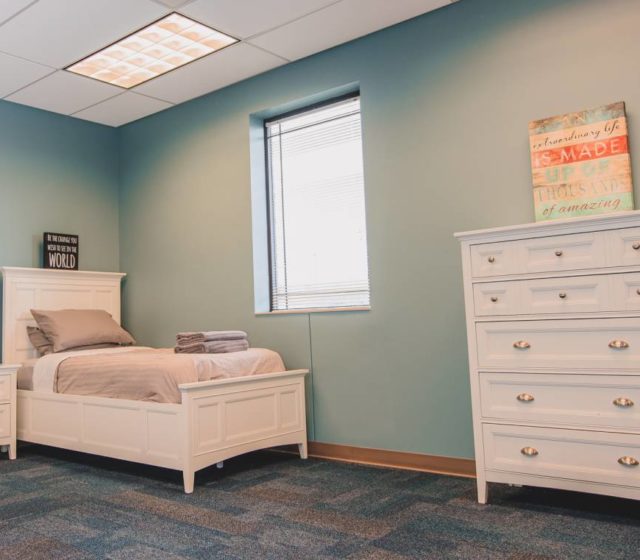Dual Diagnosis Treatment Center in Ohio
Ohio Addiction Recovery Center treats more than just addiction. Recognizing that addiction and mental health issues often go hand in hand, our approach aims to provide comprehensive care that acknowledges the interconnected nature of these challenges. When individuals suffer from both addiction and mental health conditions, this is referred to as dual diagnosis.
Dual diagnosis addiction treatment is a specialized and integrated approach designed to address individuals grappling with both substance use disorders and co-occurring mental health disorders. At OARC, our experienced staff help diagnosis and treatment co-occurring mental health conditions with medications and targeted therapies.
If you’d like to learn more about our Ohio dual diagnosis rehab or want to verify insurance coverage, you can reach us 24/7 at 800-481-8457
Private Psychiatric Rehab

Dual Diagnosis Rehab Amenities and Services:
Check Your Insurance Coverage Online
Get started below by checking your insurance coverage for mental health treatment. How do you or your loved one receive health benefits?
Who is Dual Diagnosis Treatment For?
Dual diagnosis addiction treatment is intended for individuals who struggle with both substance abuse and co-occurring mental health disorders. This population is more prevalent than one might expect, as the presence of a mental health condition can exacerbate substance use issues, and vice versa. The most common mental health disorders seen in conjunction with addiction include depression, anxiety disorders, bipolar disorder, post-traumatic stress disorder (PTSD), and personality disorders.
The relationship between addiction and mental health is often bidirectional—substance use can contribute to the development of mental health issues, and mental health disorders can increase the risk of substance abuse. In fact, it is estimated that 50% or more of individuals with a substance use disorder have a co-occurring mental health condition.
Dual diagnosis treatment recognizes the complexity of these intertwined challenges and aims to address both aspects simultaneously to foster a more sustainable and effective recovery.
Benefits of A Dual Diagnosis Treatment Center
At OARC, we don’t believe addiction occurs in a vacuum. We believe substance abuse is often a symptom of other underlying issues. When these underlying conditions are discovered and treated, individuals have a significantly increased likelihood of sustained recovery.
Benefits of dual diagnosis care include:
- Holistic Approach: One of the primary benefits of dual diagnosis treatment is its holistic approach to care. Rather than treating addiction and mental health issues in isolation, this integrated approach considers the individual as a whole, acknowledging the intricate interplay between physical, emotional, and psychological well-being.
- Improved Treatment Outcomes: Addressing both addiction and mental health concurrently has been shown to enhance treatment outcomes. By identifying and treating the root causes of substance abuse, individuals are better equipped to manage their mental health symptoms, reducing the risk of relapse and promoting long-term recovery.
- Targeted and Individualized Care: Dual diagnosis treatment recognizes the diverse needs of individuals, offering tailored and personalized care plans. Treatment is not one-size-fits-all; instead, it is adapted to address the specific challenges and circumstances of each person, improving the likelihood of successful outcomes.
- Prevention of Relapse: Individuals with co-occurring disorders often face a higher risk of relapse if both conditions are not adequately addressed. Dual diagnosis treatment employs strategies to prevent relapse by providing ongoing support for mental health management and coping skills, reducing the risk of returning to substance abuse as a way of self-medicating.
Conditions We Treat
At OARC, our clinical and psychiatric teams diagnose and treat a range of mental health disorders. Some conditions we treat include:
- Depression
- Anxiety
- Bipolar disorder
- Obsessive-compulsive disorder (OCD)
- Borderline (BPD) and personality disorders
- Trauma & PTSD
- Schizophrenia
- Mood disorders
- Behavioral disorders
If you are undiagnosed or suspect you have a comorbid mental health condition, our team can diagnose disorders and develop a treatment plan. Call us today to start your assessment: 800-481-8457
Dual Diagnosis Treatment Methodology at Ohio Addiction Recovery Center
OARC is an evidence-based facility licensed with the Ohio Department of Mental Health and Addiction Services. We apply industry leading care that includes:
- Comprehensive Assessment: Dual diagnosis treatment typically begins with a thorough assessment to identify both substance use disorders and co-occurring mental health conditions. This evaluation helps create a baseline understanding of the individual’s needs, guiding the development of an effective treatment plan.
- Detox: Our in-house medical detox center provides comprehensive medical care for withdrawal management. Most clients first start in our detox center for 7-14 days before transitioning to our residential unit.
- Residential Treatment: Our residential program is 30-45 days. While detox primarily focuses on the physical aspect of addiction, residential treatment is when dual diagnosis care begins to address underlying mental health conditions.
- Psychiatry: For certain individuals with co-occurring disorders, medication may be a crucial component of their treatment plan. You’ll have the opportunity to explore and discuss possible medications for co-occurring disorders, such as depression, anxiety, or bipolar disorder.
- Individual and Group Therapy: Therapy plays a central role in dual diagnosis treatment. Individual therapy sessions provide a private and focused space for individuals to explore the root causes of their addiction and mental health issues. Group therapy offers a supportive environment where individuals can share experiences, gain insights, and develop coping strategies while building a sense of community.
- Cognitive Behavioral Therapy (CBT): CBT is a widely used therapeutic approach in dual diagnosis treatment. It focuses on identifying and changing negative thought patterns and behaviors, helping individuals develop healthier coping mechanisms and problem-solving skills.
- Dialectical Behavior Therapy (DBT): DBT is particularly effective for individuals with co-occurring disorders. It combines cognitive-behavioral techniques with mindfulness strategies, emphasizing acceptance and change. DBT helps individuals manage intense emotions and improve interpersonal relationships.
- Family Therapy: Recognizing the impact of addiction and mental health issues on the family unit, dual diagnosis treatment often includes family therapy. This approach involves the family in the recovery process, fostering communication, understanding, and support.
- Peer Support and 12-Step Programs: Engaging in peer support groups and 12-step programs can be beneficial for individuals undergoing dual diagnosis treatment. These programs offer a sense of community, accountability, and shared experiences, reinforcing the importance of ongoing support in the recovery journey.
Break the Cycle of Addiction With Inpatient Dual Diagnosis Rehab
OARC is a residential rehab facility located in Central Ohio. Our inpatient program is 30-45 days, followed by outpatient services. Learn more about our inpatient addiction treatment center here.
If you still have questions, want to check availability for treatment, or verify insurance benefits, give us a call today at 800-481-8457. Addiction specialists are standing by to answer any questions you may have. We are in-network with most commercial insurance plans.
